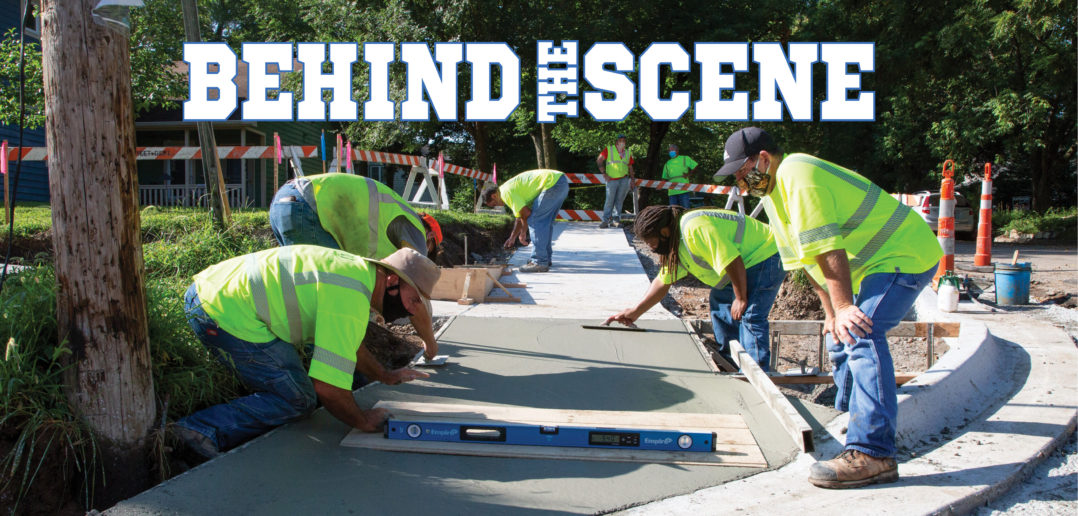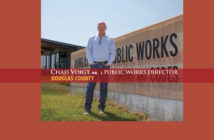| story by Cody Marshall | |
| photos by | Steven Hertzog |
City workers are there to make sure all residents’ lives continue to run seamlessly, and even during a global pandemic, their jobs get done.
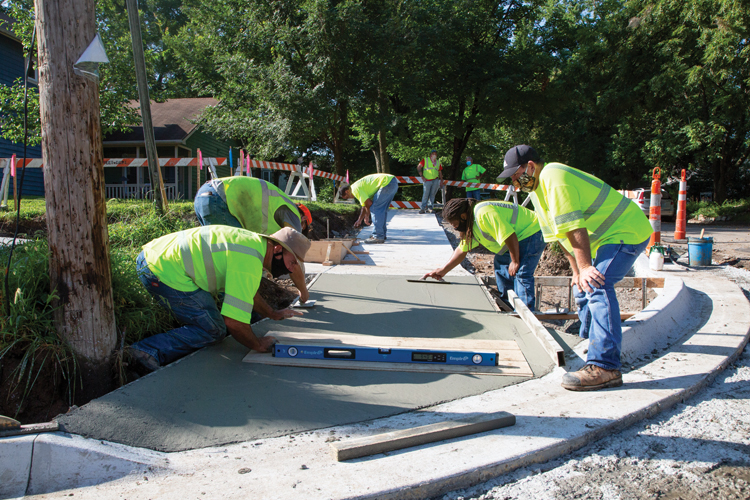
DPW crews paving and repairing sidewalks
Too often we take modern conveniences for granted. In our busy lives, we don’t always take time to appreciate the marvel of turning on a faucet and water pouring out, or flipping a switch and a light turning on, or putting the trash out and someone coming to take it away. Most often, these conveniences go unrecognized until something goes wrong: a storm knocks out the electricity, or a water pipe bursts and your morning shower is interrupted. Behind each of these amenities, which allow our community to run smoothly, are hundreds of essential workers.
Essential workers are those who go beyond the 8 a.m. to 5 p.m. Monday through Friday schedule and are on call 24 hours a day, 365 days a year. “Water and wastewater doesn’t stop,” says Mike Lawless, deputy director of municipal services and operations (MSO) for the City of Lawrence. The MSO is a large umbrella that covers many areas for the city, including solid waste, street maintenance, traffic signals, water distribution, budget and finance, household hazardous waste, yard waste collection and many more. Lawless, who oversees field operations and inspections, says of his workers, “They’re essential first-line staff; it doesn’t matter if there is a pandemic or not, the employees are here to keep doing work no matter what.”
Back in early March, when the new realities of what a COVID-19 pandemic world would look like—mandatory wearing of masks, curbside pickup for goods and food, limiting gatherings of people—those working within inherently hazardous divisions of municipal services needed to make safety adjustments to ensure their services continued uninterrupted. Discussing the challenges faced to safeguard his workers, Lawless explains the importance of being more flexible with projects, getting masks and hand sanitizer out to workers, and developing strategies to keep work crews from intermingling on field operations.
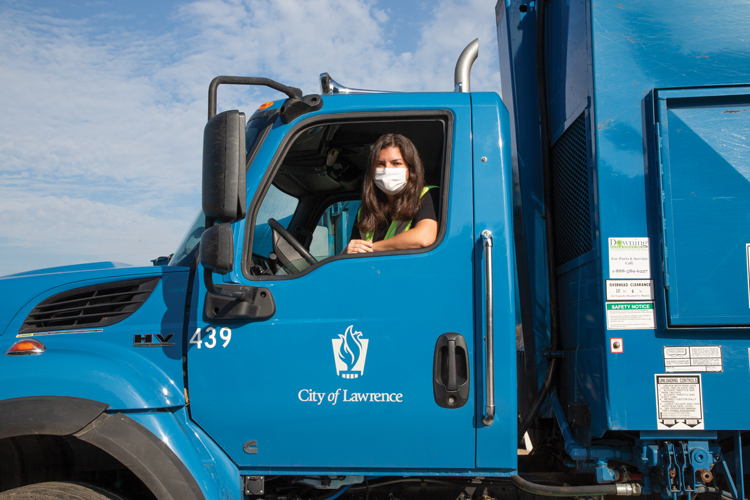
City of Lawrence Solid Waste Manager Kathy Richardson
“We created different work areas for different crews, staggered start times and lunch times, and scheduled people Sunday through Wednesday and Wednesday through Saturday.” As in any other business or industry, if an MSO employee is exposed to COVID-19, “people have to stay home and quarantine.”
Staggering work crews acts a preventative measure to limit contact among employees to safeguard that essential work continues without interruption. Given the already hazardous nature of wastewater collection and clean-water distribution, Lawless explains, “There aren’t really any additional concerns from wastewater employees, but everybody is more cautious.”
Patrick Bartlett, an MSO field operator who works specifically on water main pipe issues, says of his challenges since the pandemic started, “We have to work with changing schedules to accommodate work crews socially distancing and to make sure there are always work crews scheduled every day of the week. We’re pretty well-off in that we stay out and about, and don’t have to worry about seeing too many people. But if we have to go door-to-door to inform people about a water main break, we always wear a mask and keep 6 feet apart.”
A Major Shift
Like other cities around the world, starting in mid-March, much of Lawrence’s population began to quarantine and work mainly from home, and students began to attend school virtually. This change of environment brought with it many adjustments and some consequences, such as everyone getting a basic education in the distribution of toilet paper. People working from home meant household water usage went up, as did the amount of household trash and recycling put on the curbside.
When Kansas started issuing new mandates on bar, restaurant and other business closures, people’s daily routines shifted rapidly. “In March, we had no idea that we would come to a place where they would be shutting down businesses,” says City of Lawrence solid waste manager Kathy Richardson. “We knew there would be a shift in trash being generated [by shutting down businesses], but we didn’t know for how long. But it caught us by surprise that it changed so quickly, like the flip of a switch.”
With people working from home and eating all of their meals there, food waste such as leftovers and food packaging that might normally get more widely distributed through the workplace and restaurant trash and recycling was now concentrated in residential disposal. Richardson, who started working for the City of Lawrence as a waste reduction and recycling specialist in 2002, has been a solid waste manager since 2013. She says her workers immediately recognized this big change in waste. “You know you have to switch quickly when workers looking at the numbers of tonnage of trash and recycling picked up is shifting from commercial to residential; you quickly adjust your resources,” she says. This meant shifting commercial trash truck crews over to residential use.
The uptick in the amount of trash and recycling is not only attributed to people eating more meals at home but also other factors connected to people being stuck inside. As a result of the pandemic, the American population accidentally found itself in a mass, self-imposed KonMari Method of decluttering, asking themselves if that old worn-out chair in the corner of their living room still “sparked joy.” With no choice but to stay home, people began changing their living environments. These changes included renovation projects people suddenly saw as a necessity to make their homes more comfortable while in quarantine and creating spaces in their homes to carry out work normally done at a desk in an office. Nearly all of these changes generated more trash and recycling.
“Move-out week is the time of year [end of July, beginning of August]when we see mountains of furniture and trash when college students’ leases are ending. We have experience with that, but we were seeing move-out piles in March. This was people cleaning out their homes,” Richardson says. With Goodwill, Salvation Army and other thrift and consignment stores not accepting donations during the first months of the pandemic, what that meant to the waste industry “was a lot more trash instead of another more useful life for those items,” she continues.
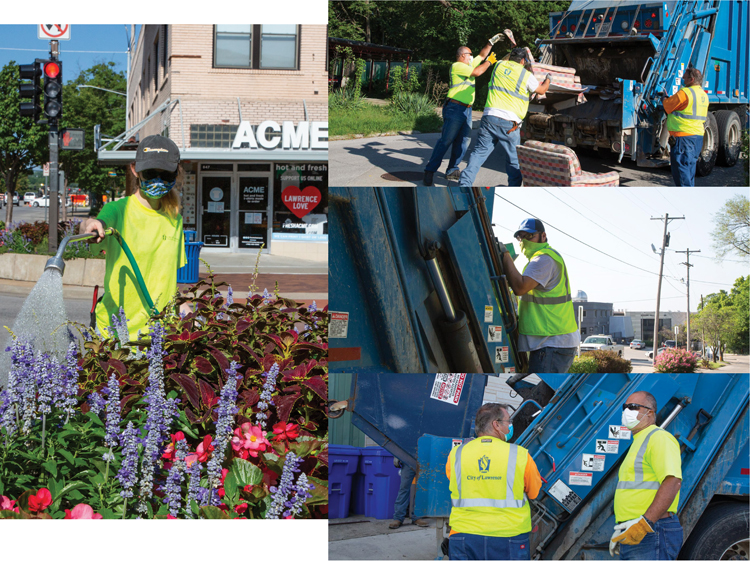
:LEFT: Watering and caring for fl owerbeds along Mass St; RIGHT:City solid waste collectors picking up trash of all kinds
Safety First
Solid waste collection is the fifth most dangerous job in America, and given the inherently hazardous work under normal circumstances, the safety of Richardson’s workers during the pandemic meant increasing protocols to protect their health. She emphasized the use of personal protective equipment (PPE) for work crews, which includes gloves, safety glasses, masks and hard hats, among other items. “While employees can wear their own cloth masks, the City has also provided disposable masks and cloth masks to employees,” she explains.
Ryan McPhail, a City of Lawrence solid waste loader, says of the new safety implementations: “Everyone bought into doing the right thing immediately. Everyone has had a mask on since mid-March, and there has been no wavering on that.”
Trying to distance crews away from each other as much as possible is one of the main safety protocols immediately implemented during the pandemic. Crews start their morning shifts in 15-minute increments to avoid directly interacting with one other. Regular, efficient removal of trash is critical to the health and safety of communities, and that is only possible by ensuring the health and safety of public works employees.
Richardson says that in the beginning of the pandemic, “workers were definitely concerned and worried, because we weren’t sure what was going to happen, and there were a lot of unknowns. The City did a great job of sending information to staff to push the idea of preventing the spread of COVID-19. Employees all have their temperature taken when they arrive to work and at the end of their shift. These steps calmed a lot of worried employees.”
Because of individual work crews not having the option to socially distance when they are working on the same trash truck, instituting other sanitary measures was critical. This includes ensuring workers always have access to hand sanitizer as well as soap and water for washing their hands on their routes. Prior to the pandemic, workers normally washed their hands in the restrooms of restaurants and businesses on their routes, no longer a readily available option. Workers also spray their trucks with disinfectant in the morning and throughout the day.
Among the daily challenges, there were many basic logistics that needed to be worked on in the MSO, such as limiting employees punching a time clock to avoid the spread of germs and instead having their supervisors clock them in. Richardson adds that one way citizens of Lawrence can assist in the safety of solid waste workers is to ensure all disposable masks and gloves are bagged and put into their trash cans, not recycling bins.
Are solid waste workers worried about greater exposure to COVID-19 than the average citizen? “Yeah, we are because we touch and deal with all sorts of stuff,” McPhail says. “The type of material you deal with on a day-to-day basis causes concern, and I’m subject to dealing with citizens on a daily basis.”
When considering the great upheaval of daily life as a result of the pandemic, regular amenities afforded the people of Lawrence by the City’s Municipal Services and Operations department continues nearly seamlessly as a result of hardworking, dedicated essential workers not always seen by the average citizen. “One thing that happened for solid waste, when Kansas and other states started shutting down, was citizens started seeing our workers now that they were at home, and it reminds us that we are all one community,” Richardson says.
“We’re trying our best, we all have families, and we all have loved ones; and we want to keep up the same great type of service that we want to provide to them,” McPhail adds.

